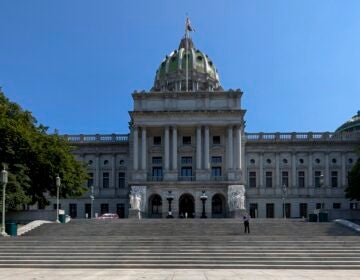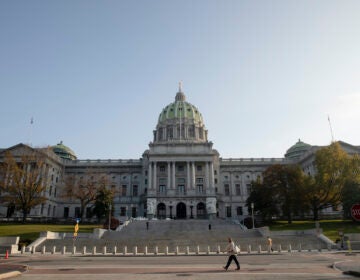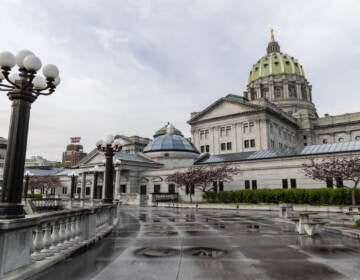House passes familiar budget plan — minus new revenue
House lawmakers narrowly passed part of a proposal Tuesday night to finish Pennsylvania's overdue state budget.

The state Capitol in Harrisburg, Pa., is shown in December 2016. (Matt Rourke/AP Photo, file)
House lawmakers narrowly passed part of a proposal Tuesday night to finish Pennsylvania’s overdue state budget — their first significant action since talks melted down two weeks ago.
It’s extremely similar to a plan that previously failed to garner support. However, this version borrows more money and doesn’t include significant recurring revenue, from taxes or otherwise.
It came together on the heels of a cooling-off period for the legislature, following Governor Tom Wolf’s announcement he would balance the budget unilaterally.
Wolf’s strategy — which involves borrowing against liquor profits and leasing the state farm show complex — drew criticism from Republicans.
House Majority Leader Dave Reed said the legislature is presenting a better option — even if it’s no one’s preference.
“Look, in an ideal world, you do a little bit less borrowing, you do a little bit more in recurring revenue,” Reed said. “There weren’t enough votes on both side of the aisle to do that, so you’ve got to go to the next plan.”
The GOP-authored plan would fill $1.5 billion dollars of a $2.2 billion budget gap by borrowing against the commonwealth’s Tobacco Settlement Fund.
That’s not a new idea, but it’s a bigger loan than in previous proposals.
The money would be paid back with interest over 20 years, though language in the bill allows the state to delay starting those payments until 2019.
The portion of the plan passed Tuesday also includes minor taxes on fireworks and online sales, which would raise about $12.6 million altogether.
The House is also budgeting for $765 million additional dollars that will have to pass in separate bills.
They include $265 million from a still-unnegotiated gambling expansion, $300 million in special fund transfers, and a $200 million transfer from the state’s Joint Underwriting Association (a state group that gives healthcare providers medical malpractice insurance, and which has previously sued the state to keep that money).
The bill passed on to the Senate in a bipartisan — but narrow — decision, only garnering the minimum number of affirmative votes needed.
Both Democrats and Republicans spoke passionately against it on the floor — many condemning the practice of borrowing heavily to keep the state’s general fund liquid.
“As much as I would like a budget and I’d like it yesterday, I can’t vote for that,” said Kate Harper, a moderate Montgomery County Republican.
Leaders in both caucuses threw their support behind it. According to House Democratic Leader Frank Dermody, the decision is about creating options.
“We want to move the process forward, get this bill over to the Senate, see if we can get a final agreement on all the code bills that are left out there,” he said. “I think if this can be part of a final answer, it ought to be part of it.”
A Senate spokeswoman said only that the chamber looks forward to reviewing the House’s proposal.
A spokesman for Governor Tom Wolf said the governor is also looking over the plan, but still favors a natural gas severance tax to close the deficit.
WHYY is your source for fact-based, in-depth journalism and information. As a nonprofit organization, we rely on financial support from readers like you. Please give today.






